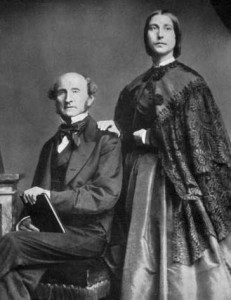Influences
John Stuart Mill’s father was a huge influence on him. He was the one that raised, taught, and worked with him. A lot of his values and beliefs were the same of his father’s. On June 23, 1836, his father passed away. Along with his death was any speculation of the father-son duo working together on their thoughts. His father remained stable with his mental cognition even as his physical health was failing him. According to John Stuart Mill, “His principal satisfaction, after he knew that his end was near, seemed to be the thought of what he had done to make the world better than he found it; and his chief regret in not living longer, that he had not had time to do more (Autobiography, 1873.)”
Mill felt the influence of historicism, French social thought, and Romanticism. Thinkers like Coleridge, the St. Simonians, Thomas Carlyle, Goethe, and Wordsworth were also very influential on his thought. This led him to begin searching for a new philosophy that would be more sensitive to changes created by culture and history and would emphasize the advancement of society, including the cultivation of dispositions of feeling and imagination. This was different from the way he was taught and raised. He saw how things needed to be changed.
John Stuart Mill married his wife, Harriet Taylor in 1851. They were intimate friends for more than twenty years and she was a great influence on his life, ideas, and instrumental work. He refers to her as being the most admirable person he had ever known. He claims that she taught him more than any other teachings before. She was the main reason for his continual mental progress. Unfortunately, she passed away after only seven years of marriage to John due to a severe lung congestion.
One of Mill’s essays has a chapter dedicated to his wife. She argues on the importance of education for the future of society. She also published her own work under the name of her husband. Of course, she also believed in women’s rights and demanded that they have the same rights as men. Her beliefs were much more radical than those of her husband. John Stuart Mill’s “On Liberty” was dedicated to her because they had worked on it together. Unfortunately she passed away from tuberculosis complications in 1858.
References:
John Stuart Mill . (2014). The Biography.com website. Retrieved 08:50, Apr 14, 2014, from http://www.biography.com/people/john-stuart-mill-9408210.
John Stuart Mill. (2014). The Famous People website. Retrieved 12:47, Apr 7, 2014, from http://www.thefamouspeople.com/profiles/john-stuart-mill-150.php.
Mill, J. S. (1873). Autobiography. New York : P.F. COLLIER & SON COMPANY.

